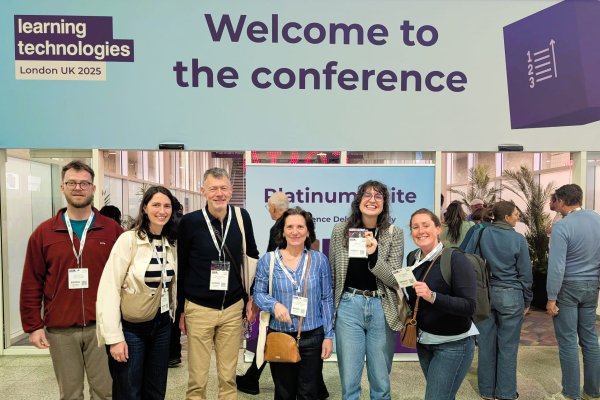Why every L&D professional should attend Learning Technologies in London next year
Written by Bart Corthouts, 09/05/2025 • Blogposts
Reflections and insights from the 2025 edition
Two weeks ago, Febelfin Academy attended the Learning Technologies conference and exhibition in London, together with Tony De Rouck (Crelan) and Sarah Grijseels (Belfius Bank). This event is arguably the most important in Europe for anyone working in the field of corporate learning and development. Each year, it attracts over 11,000 visitors from around the world and features more than 200 free L&D seminars, 200 exhibitors, and a paid conference programme with leading international speakers. It’s a unique space where trends, technology, and practice come together. For any L&D professional, it’s much more than just an exhibition – it’s a chance to stay ahead of the curve and get a glimpse of what the future holds.
A complete experience for L&D professionals
What makes this event particularly valuable is the combination of inspiration and practical application. On-site, you literally discover the future of learning: AI-powered learning platforms, innovative microlearning tools, interactive content creation, data-driven learning strategies... For organisations in the banking sector—where compliance, skills development, and performance are key—these technologies are not just gadgets; they are real levers for training, reskilling, and developing employees.
“A particularly inspiring and insightful moment, which has already led to concrete initiatives.” — Tony De Rouck, Crelan
Alongside the exhibition, a two-day conference brought together more than 80 international speakers who explored timely and relevant topics: How can we strategically position L&D in times of change? How do we build a learning ecosystem that truly supports skills development and talent management? And how can we leverage AI and data to make the impact of learning measurable?
“Thanks to the initiative of Febelfin Academy, I had the opportunity to attend the Learning Technologies conference in London this April, an experience that was both enriching and inspiring. The high-level sessions and exchanges with international experts were a true source of innovation, but also a chance to take a step back and reflect on how we could integrate these new technologies into our learning journeys.
I particularly appreciated the diversity of approaches and the quality of the solutions presented.
From this experience, I take away two key lessons:
It is essential to stay continuously informed about new technologies in our L&D field, as they evolve rapidly and risk overtaking us.
We need to ask the right questions when faced with the emergence of these technologies, in order to respond thoughtfully and make the most relevant choices.
5 Key Questions
Which technologies will have the greatest impact on my organization?
Which technologies will be most critical to my future role? (Future-proof skills!) This also implies acquiring new competencies.
How are emerging technologies transforming our daily lives — including the way we work and learn?
Ask the essential questions as early as possible: Why? and How?
What makes my work fundamentally human and irreplaceable?
This trip was also a great networking opportunity with Febelfin Academy and its partners, strengthening ties with other professionals in the sector.
I highly recommend every member of the L&D community to experience this event, as it elevates our profession — and the entire L&D sector, to a higher level with each edition." - Sarah Grijseels, Belfius Bank
Rethinking Compliance: Insights from Standard Chartered Bank
One of the most impactful talks was delivered by Standard Chartered Bank, focusing on their approach to compliance training. A familiar topic for many banks — and often a source of frustration. Think of employees who rush through their mandatory training modules just to “get it over with.” Sounds familiar? Probably. Is it effective? Hardly.
Standard Chartered Bank chose a completely different approach. Their starting point was a pragmatic observation: average attention spans are decreasing. With digitalisation, employees are constantly interrupted — by emails, notifications, calls... And it takes an average of 20 minutes to regain optimal focus. The conclusion? You have to grab the learner’s attention immediately. As they put it themselves: “You need to suck them in.”
Their golden rule? For every new compliance training module, they always ask: “Can the key message of this training be written on a post-it note?” Why? Because too often, trainings try to pack an overload of information into a single module. Their example on anti-money laundering (AML) was particularly striking: there was a strong temptation to include the equivalent of half a regulation and an entire policy into one overly long e-learning. Yet, the core message of AML could be summarised as: “If it’s suspicious, report it.” That’s the essence. The rest is context. That context has value, of course, but it’s not essential for everyone. The goal is not to turn every commercial employee into an AML expert — that’s the specialist’s job. What those employees need to know must be crystal clear.
Experimenting by finding the balance between innovation and impact
Another interesting angle discussed at the event was the call to find a balance between innovation and validation: “Innovate, but validate.” One must dare to experiment with AI, microlearning, or blended learning paths, but always assess their impact. Not everything has to be ultra-technological to be effective.
At the same time, the issue of cost-effectiveness is becoming increasingly important. We now ask: “What is the real cost of this training?” It’s not just about design fees, but also the cost of learning. By multiplying the average hourly wage by the duration of the training and the number of participants, you get a concrete estimate. This leads to an unavoidable question: Can we make it shorter? Is it necessary for everyone to take this training?
This way of thinking pushes L&D teams to take a more critical look at their offerings and make choices driven by impact and relevance.
“Confidence kills curiosity”
Another striking session focused on curiosity and how it sometimes conflicts with compliance. While some actively seek innovation, others adopt a more wait-and-see attitude. Consciously encouraging curiosity, towards the world, others, their behaviors, but also towards oneself, fosters a more flexible, open, and positive attitude.
A small concrete example: instead of asking the classic “How are you?” to a colleague, why not try “What’s the most interesting thing you’ve learned this week?” The answer might just surprise you.
Why you should attend next year
For L&D professionals in the financial sector, Learning Technologies is much more than just a conference. It’s a valuable source of concrete ideas, international inspiration, and strategic insights. You’ll discover how other organizations approach similar challenges, test the latest solutions, and leave with a wealth of ideas to implement.
It’s also a great reminder: as training professionals, we play a key role in the transformation of the world of work… as long as we continue to learn ourselves.
So, mark your calendars now: Learning Technologies 2026 in London, on April 29 and 30.
It’s an investment that’s truly worth it.
(Febelfin Academy participated in this event with a paid entry, with the much-appreciated support of the VOV Lerend Netwerk. Employees under Commission Paritaire 310 are entitled to a €300 contribution towards the participation fees.)







